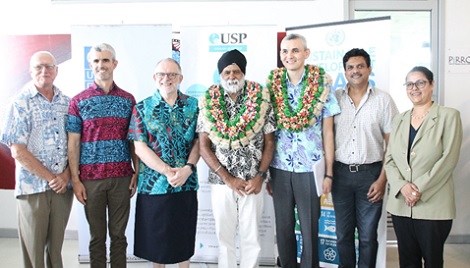Related News


An Innovation Hub and co-working space was launched by The University of the South Pacific (USP) and the United Nations Development Programme (UNDP) at the Laucala Campus on 1 February 2019.
The event was attended by Mr Bakhodir Burkhanov, UNDP Resident Representative for the Pacific; Professor Pal Ahluwalia, USP VCP, H.E Mr John Feakes, Australian High Commissioner; H.E Mr Johnathan Curr, NZ High Commissioner; USAID Programem, Ms Maria Elder, members of USP’s SMT, representatives from civil society, international and regional organizations, entrepreneurs and innovators and staff and students.
Professor Derrick Armstrong, Deputy Vice-Chancellor Research & International welcomed everyone saying the gathering was not only to launch the Innovation Hub, but also to celebrate the critical role that collaborative partnerships play in supporting and increasing innovative outcomes.
In his address, Professor Pal Ahluwalia, Vice-Chancellor and President especially acknowledged Mr Bakhodir Burkhanov and other guests for engaging in meaningful partnerships committed to supporting innovation and accelerating the implementation of Sustainable Development Goals in the Pacific.
USP he said, is a University that is on the move having been recently ranked on Unirank among the top 50 universities in Oceania and the top nine per cent of universities globally.
“It is a massive accolade for a developing country university and we are the premier institution in the region but we cannot sit back on our laurels and say that we have made it,” he said.
“It is these kind of initiatives that are so vital to make sure that we stay at the forefront of where we need to be,” he added.
Professor Ahluwalia commented that innovation is all about USP’s engagement with industry and development partners, among others.
“Every one of our graduates should become agents of development where they will embrace Pacific values so that when they go back to their communities they can give back to it. That is the core of what innovation is and we must ensure that we are developing those kind of people in this hub,” he stated.
“Ultimately my dream is that USP becomes a science pod where we can bring more value-added industries to work in partnership with us and to be part of that dream to make this a truly knowledgeable economy,” he said.
Professor Ahluwalia expressed his gratitude to UNDP for its contribution to support innovation at USP and the Pacific.
“Your contribution is greatly appreciated and USP staff, students, and Pacific people in general are blessed by your support. We are looking forward to collaborate more with you in the future,” he said.
Mr Bakhodir Burkhanov, Resident Representative UNDP Pacific Office in Fiji said UNDP is excited to help create a facilitated co-working space at USP.
“I must say that we found the perfect partner to host it. The USP is a centre of gravity for learning, research and innovation in the Pacific. As the regional university, it is in the best position to offer a working environment where people from all over the region meet, work, network, share ideas and collaborate on projects,” he said.
According to Mr Burkhanov, this is indeed the very concept of the Innovation Hub and a Co-Working Space: to bring together individuals from different industries, countries and areas of expertise – people who otherwise would not know of each other.
The Hub he said, will serve as a platform for learning, mentoring and south-south knowledge exchanges for the governments, faculty, researchers, entrepreneurs and social innovators across the Pacific region. Priority will be given to youth, women and differently abled persons.
Mr Burkhanov also acknowledged the Australian Government and the DFAT-UNDP regional programme, who have not only supported the initiative financially, but have been a strong positive force for innovating development in the Pacific.
Three winners of the Youth Co: Lab were announced at the event, who will be supported by UNDP to the Regional Youth Co:Lab Springboard programme in Vietnam in March to promote the SDG focused innovation across Asia and the Pacific.
Co-created in 2017 by UNDP and the Citi Foundation, Youth Co:Lab aims to establish a common agenda for countries in the Asia-Pacific region to empower and invest in youth, so they can accel¬erate the implementation of the Sustainable Development Goals (SDGs) through leadership, social innovation and entre-preneurship.
By developing young people’s 21st century skills, and by catalysing and sustaining youth-led startups and social enterprises across the region, Youth Co:Lab is positioning young people front and center in order to solve the region’s most pressing challenges.